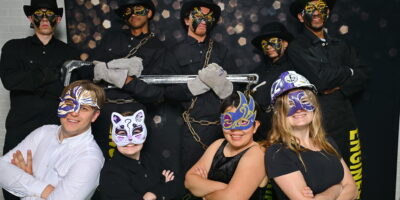The Friend of the Society Award is awarded to a faculty or staff member every semester for their contributions to bettering the mental health of their students. They are selected through a nomination period by a committee composed of the VP Academic ‘A’, VP Student Life ‘B’, and three at large council-elected members. The winning person’s nomination(s) must indicate that they have contributed significantly to at least one of the following:
1. Advocating on behalf of students to eliminate elements that have a negative effect on student mental health
2. Showing a long-term commitment and vested interest to the betterment of student mental health
3. Taking action to directly improve the mental health of students
Professor MacGregor has always been known to look out for her students and check in on their mental health. In first year, if a student seems to be struggling with their midterms, she will reach out to the student and see if there’s anything she can do to help. She also encourages all the inter-class bonding that takes place in systems; she always attends coffee houses and has been known to perform and interact with her students. Her office door is always open and available for students to come in, ask questions, and have candid conversations about their mental health. She’s extremely knowledgeable about available mental health resources and continually seeks out more in order to be able to provide better support to her students. In class, she’s willing to modify due dates and marking schemes in order to benefit students. Professor MacGregor has been offering support to all SYDE and BME students for a long time, and continues to show an interest in supporting them and their mental health. If you want to hear more about her efforts to better her students’ mental health, read the interview below to find out more!
What brought you to Waterloo and what kept you at Waterloo?
Carolyn McGregor initially started as a Psychology student at the University of Waterloo, one of the first Psych co-op students, in fact. During her co-op at Transport Canada, she became interested in systems and industrial engineering. This lead to her taking courses in Systems Design Engineering while at Waterloo and she went to the University of Toronto to study Industrial Design. Afterwards, she started work at Human Factors North doing consulting, but when her family wanted to raise kids here in Waterloo, she took a sessional job in the Systems Department in 1994. She became full-time in 1996, and she can’t imagine any other place where should would be. Systems just fits with her, and she enjoys being with the students.
How do you embrace your department’s community, both your colleagues and your students?
The department has a long history of community, recalling how even very old alumni will say SYDE had a community. “Systems felt like a family. (…) They made me feel like I was part of a family. So it’s easy to help pass that on when you have others that make you feel like you belong.” A big contribution early on was the decision to invest in dedicated classrooms rather than dedicated research areas. The bigger size nowadays has made it a bit more challenging, but you can still see the culture starting at the first-year level due to upper-years helping them fit in.
What is your favourite part about interacting with students and how do you make the SYDE environment open and comforting?
She really enjoys having conversations with students. Often, she’ll have the hard conversations, since some students are seriously struggling with academics or other issues. This is all the more reason why it’s important to make students feel like there are multiple touchpoints available to them. They might meet with Kristen Deckert, the SYDE Undergraduate Administration Coordinator first. They might go to a continuing lecturer that have been hired by the department in the last few years. The goal is to create a safe space for students to talk about issues, because having tough conversations is difficult, but if you can trust the person you’re speaking with, it can be a bit easier. Hopefully McGregor and the student during the conversation can figure out a positive path forward together.
Why is mental health important to you? Why is students’ mental health important?
Professor McGregor is very familiar with the subject, as she personally struggles with mental health issues, as do some of her family members. “It doesn’t mean we can’t learn to manage it, but it does mean that we have to be mindful of when we’re starting to hit issues where maybe our management is slipping. Sometimes we just need to be able to say to someone else ‘I think I’m going nuts’ without that other person panicking.” Despite mental health issues being common, students might be afraid to speak up due to the stigma or worry it may affect how they are viewedt; they may be embarrassed, or may not have family to talk to. We all have good days and bad days, and we all need somebody we can trust when we’re at our lowest.
Do you think faculty and staff get enough education regarding how mental health affects students?
Short answer: no. Longer answer: Faculty and staff already have a lot on their plate with teaching, other commitments within the university and anything off campus. Interacting with students who are struggling is often emotional and can be just as stressful on the person offering support as the person receiving it. The bottom line is they need more support. Faculty and staff should receive better training on how to offer direct help in crisis, as well as how to look after their own mental health and life balance. They are often the first point of contact for students, and it’s hard to help others without that necessary training.
What message would you like to send to students reading this article?
It’s okay to be you, whatever that is. It is okay to not succeed in academics and have a stumble. Sometimes knowing that you’re okay with a stumble can allow you to pick yourself up earlier or even catch yourself beforehand. “Be yourself, and it’s okay to let others see yourself.”
If you have any questions about the Friend of the Society Award, please feel free to reach out to Thomas Dedinsky at vpacademic@engsoc.uwaterloo.ca. If you would like to hold one of the student at large positions for the Friend of the Society Award committee, come to the second EngSoc Council Meeting next term!



